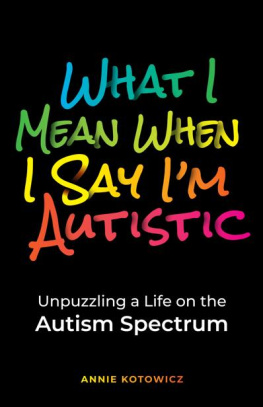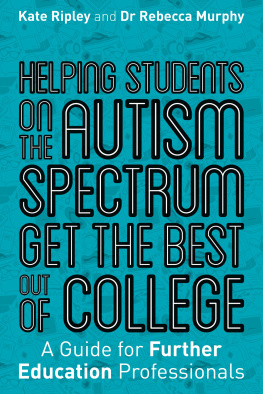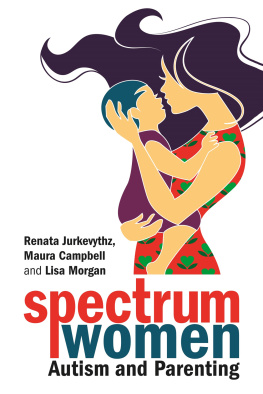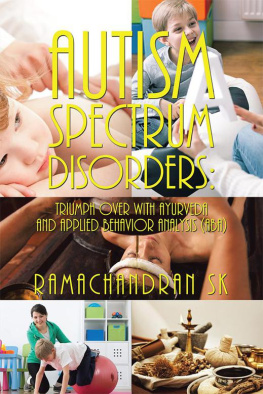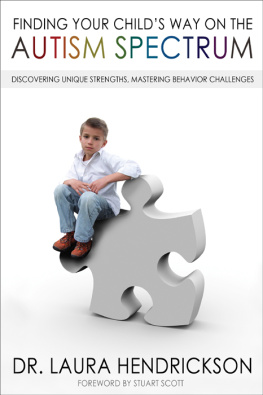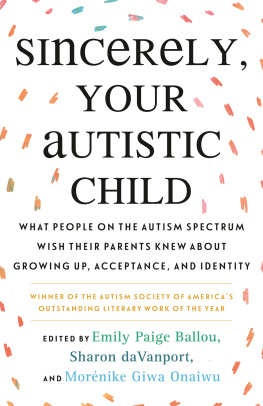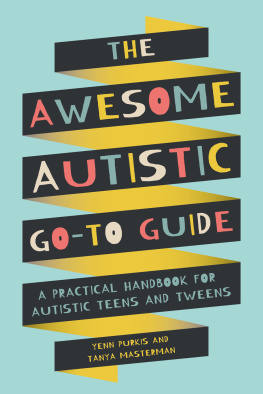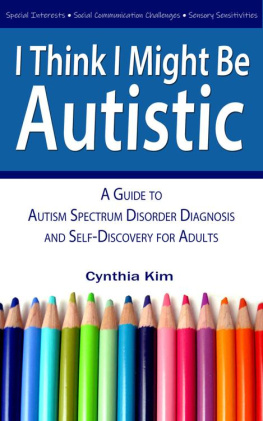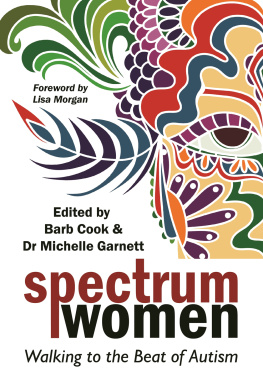Annie Kotowicz - What I Mean When I Say Im Autistic: Unpuzzling a Life on the Autism Spectrum
Here you can read online Annie Kotowicz - What I Mean When I Say Im Autistic: Unpuzzling a Life on the Autism Spectrum full text of the book (entire story) in english for free. Download pdf and epub, get meaning, cover and reviews about this ebook. year: 2022, publisher: Neurobeautiful, genre: Non-fiction / History. Description of the work, (preface) as well as reviews are available. Best literature library LitArk.com created for fans of good reading and offers a wide selection of genres:
Romance novel
Science fiction
Adventure
Detective
Science
History
Home and family
Prose
Art
Politics
Computer
Non-fiction
Religion
Business
Children
Humor
Choose a favorite category and find really read worthwhile books. Enjoy immersion in the world of imagination, feel the emotions of the characters or learn something new for yourself, make an fascinating discovery.
- Book:What I Mean When I Say Im Autistic: Unpuzzling a Life on the Autism Spectrum
- Author:
- Publisher:Neurobeautiful
- Genre:
- Year:2022
- Rating:3 / 5
- Favourites:Add to favourites
- Your mark:
- 60
- 1
- 2
- 3
- 4
- 5
What I Mean When I Say Im Autistic: Unpuzzling a Life on the Autism Spectrum: summary, description and annotation
We offer to read an annotation, description, summary or preface (depends on what the author of the book "What I Mean When I Say Im Autistic: Unpuzzling a Life on the Autism Spectrum" wrote himself). If you haven't found the necessary information about the book — write in the comments, we will try to find it.
Annie Kotowicz: author's other books
Who wrote What I Mean When I Say Im Autistic: Unpuzzling a Life on the Autism Spectrum? Find out the surname, the name of the author of the book and a list of all author's works by series.
What I Mean When I Say Im Autistic: Unpuzzling a Life on the Autism Spectrum — read online for free the complete book (whole text) full work
Below is the text of the book, divided by pages. System saving the place of the last page read, allows you to conveniently read the book "What I Mean When I Say Im Autistic: Unpuzzling a Life on the Autism Spectrum" online for free, without having to search again every time where you left off. Put a bookmark, and you can go to the page where you finished reading at any time.
Font size:
Interval:
Bookmark:
This is a pirated book.
Ive been where you areunable to afford all the books on my wish list, and unable to find some of them in my local library.
Someday, if you can, I hope youll consider buying this book. Buying a copy and donating it to a library would be even better, to help me reach more readers while still earning income as an author.
If you prefer to give me a small tip, you can do so at: neurobeautiful.com/patreon
Happy reading!
Copyright 2022 by Annie Kotowicz
All rights reserved. No part of this book may be reproduced or transmitted, except for brief quotations, without written permission from the publisher.
This book is not intended to diagnose, prevent, cure, treat, or modify any disorder, disability, disease, condition, or neurotype.
First Edition
ISBN: 979-8-9864827-1-2 (paperback)
ISBN: 979-8-9864827-2-9 (hardcover)
ISBN: 979-8-9864827-0-5 (ebook)
Library of Congress Control Number: 2022911768
Published by Neurobeautiful
neurobeautiful.com
Rockville, MD
Why This Matters
A Conversation with Little Me
How I Found Out Who I Am
How Autism Works
How It Feels to Feel So Much
How I Take It All In
How I Let It All Out
How I Get Along with People
How People Get Me Wrong
How I Reach a Tipping Point
How Else My Brain Is Different
How Im Creating a Better Life
How to Support People Like Me
How My Heart is Healing
Grateful Acknowledgments
Sources & Resources
More Possibilities
There are thousands of uswomen who discovered our autism well into adulthood, well past many of the memories it explains. Were too late in life to prevent a multitude of misunderstandings, yet too early in history to say, I am autistic! and trust that everyone will know what we mean. We need to unpuzzle the past to heal our hearts, and the present to see who we are.
There are millions of usautistic people of all ages and genders, trying to make ourselves understood, trying to survive as sensitive souls in an unwelcoming world. Were hardly ever fully at ease, and hardly ever fully ourselves. We need to unpuzzle our behavior so that people will recognize our reasons, and our rights.
There are billions of ushumans everywhere, with access to our own minds and no one elses, tossing one another songs and sentences to bridge the gap. Were endlessly experimenting with new ways to translate our experiences, and listening curiously as others experiment, too. We need to unpuzzle one another, and it becomes easier the more we unpuzzle ourselves.
Yet there is only one me, and this is my story. Not the whole story of a life, but parts of itthe parts that best illuminate what I mean when I say Im autistic, and the parts that were most puzzling before I discovered this crucial fact about myself.
Maybe youll see yourself reflected in these pages. Maybe you wont, even if you are autistic. Maybe youll see a palette of possibilities for what people you love might be feeling, or maybe youll doubt that I could possibly have a mind like theirs.
Maybe youll underline what resonates, and cross out what doesnt, before handing the book to someone else to understand you better. Maybe, like me, youve been wounded by the stereotype of autism as a puzzle, or at least the implication that were impossible to understand.
Ive spent five years trying to undo that assumption, writing posts and articles under the pen name Neurobeautiful. For two of those years, I also worked at a school where most of the students are autistic. There, I tried to figure out which of my experiences are caused by autism, and which are merely me.
I eventually concluded that theres no difference between the two. Autism affects all of my experiences, but it does so in ways that are unique to me. Others may be similarmore similar than we appear from the outsidebut no two minds are identical, even if we share the same neurotype.
In spite of the wide variety across the autism spectrum, I hope that this book will give you a way to interpret any autistic behavior through the lens of neuroscience. Ive applied my understanding of autism to personal stories, but this is more than a memoir. Its also a model of how autism works, a mirror of how autism can feel, and a manifesto celebrating the beauty of autistic brains.
Me: You look kind of grumpy.
Little Me: Yeah, a teacher was mean to me.
Me: What happened?
Little Me: I was using my hula hoop as a jump rope, and he yelled, STOP THAT!
Me: Wait as a jump rope?
Little Me: I mean, holding it in front of me, and stepping through, and then flipping it back over my head so I can step through again.
Me: Sounds fun.
Little Me: I do it all the time at recess, but he wouldnt let me do it in the hallway.
Me: Ah, see, that makes sense. Because you could hit someone.
Little Me: But he acted like I broke a rule! Nobody told me it was a rule.
Me: There are a bunch of rules that no one will ever tell you. Theyre called unspoken rules.
Little Me: Well, if it was unspoken, people shouldnt get mad at me for not knowing it.
Me: Yeah, they shouldnt. But Im pretty sure he wasnt as mad as he sounded. He just wanted you to stop right away.
Little Me: I think he was mad. I think he doesnt like me.
Me: He doesnt understand you, so he doesnt know how much you care about understanding the reasons for things.
Little Me: Unspoken reasons?
Me: Unspoken reasons for unspoken rules.
Little Me: Those arent fair.
Me: Theyre not, but youll get better at figuring them out over time. Its even kind of fun to find the patterns behind them.
Little Me: Patterns?
Me: Like, anything that might hurt someone is usually a bad idea.
Little Me: I know that already.
Me: But there are a million ways to apply it. And no one has listed all of them.
Little Me: I could! That sounds fun.
Me: You could, but the list would never be finished. Its better to learn how people think. Most of them think in a different way than you do.
Little Me: I know.
Me: You mean you know that its different. Someday, youll learn howand why.
As a child, I could already tell that most people experienced life very differently than I did. However, I suspected that there might be a few whose experiences were closer to mineor almost the same, if we found ourselves in identical situations.
Every once in a while I would spot a stranger, or sometimes a minor character in a movie or play, and imagine that she might be one of the humans who felt like me. I imagined us having similar motivations, reactions, memories, and perspectives.
I had a word for such peoplea Me. I would see them and think to myself, I wonder if shes a Me.
I eventually learned that it wasnt just my imagination. I really do see the world differently, and was trying to spot others who share my neurotypethat is, minds on the autism spectrum. I even labeled it correctly, since autism comes from the Greek word for self. Once I knew where to look, I found that the world is full of people like me.
In my mid-twenties, I met a new group of friends who understood me in ways that no one else did. They seemed to ignore societal expectations of how a person should sit, talk, move, dress, and act, freeing me to do the same. They also actively appreciated parts of my personality that others found annoying, such as my drive to clarify precisely what I mean.
Font size:
Interval:
Bookmark:
Similar books «What I Mean When I Say Im Autistic: Unpuzzling a Life on the Autism Spectrum»
Look at similar books to What I Mean When I Say Im Autistic: Unpuzzling a Life on the Autism Spectrum. We have selected literature similar in name and meaning in the hope of providing readers with more options to find new, interesting, not yet read works.
Discussion, reviews of the book What I Mean When I Say Im Autistic: Unpuzzling a Life on the Autism Spectrum and just readers' own opinions. Leave your comments, write what you think about the work, its meaning or the main characters. Specify what exactly you liked and what you didn't like, and why you think so.

